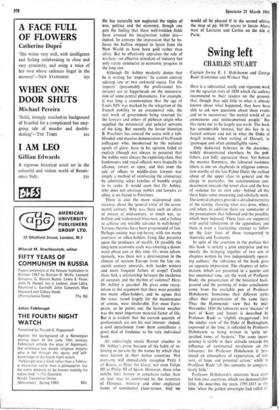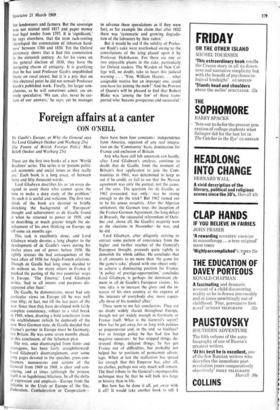Swing left
CHARLES STUART
Captain Swing E. J. Hobsbawm and George Rudd (Lawrence and Wishart 70s)
Here is a substantial, costly and vigorous work on the agrarian riots of 1830 which the authors recommend to their readers on the grounds that, though they add little to what is already known about what happened, they have been able to ask new questions about these events and so to reconstruct `the mental world of an anonymous and undocumented people.' But this turns out to be largely eye-wash. The book has considerable interest, but this lies in its factual content and not in what the Duke of Argyll termed, when writing of Disraeli, its `grotesque and often unintelligible views.'
Only dedicated believers in the doctrines, widely disseminated elsewhere by the Pub- lishers, can fully appreciate these. Yet behind the marxist flummery, the laboured footnotes (there is one on shepherds in religious conven- tion worthy of the late Palme Dutt), the stylised abuse of the upper class in general and the clergy in particular, the sanctimonious con- descension towards the lower class and the-rove of violence for its own sake—behind alt' this there hides some interesting and scholarly work. The central chapters provide a detailed narrative of the rioting, showing what was done, Where, and when; in addition there are summaries-Of the prosecutions that followed and the penalties which were imposed. These facts are supported with useful tabulations in the appendices; ' and there is even a fascinating attempt to ft:410W up the later lives of those transported' to Australia and Tasmania.
In spite of the assertion in the preface 'that this book `is strictly a joint enterprise and not merely the stringing together of two sets of chapters written by two independently operat- ing authors,' the substance of the book gives an opposite impression. The chapters of infor- mation, which are presented in a quieter and less emotional tone, are the work of Professor Rudd; the presentation of the historical back- ground and the pointing of wider conclusions come from the excitable pen of Professor Hobsbawm. Sometimes their different styles affect their presentation of the same facts. Thus the Hammonds' view that by mid- November 1830 the labourers were 'masters' of part of Kent and Sussex is described by Professor Rude as `slightly exaggerated'; but the similar view of the Duke of Buckingham, expressed at the time, is ridiculed by Professor Hobsbawm as being written in 'quite un- justified tones of hysteria.' The same incon- sistency is visible in their attitude towards the influence of continental revolution on the labourers; for Professor Hobsbawm it 'pro- duced an atmosphere of expectation, of ten- sion, of hope and potential action,' while' to Professor Rudd 'all this amounts to compara- tively little.'
Professor Hobsbawm's emotions have even led him into assertions which are demonstrably false. He describes the years 1795-1815 as the time 'when the golden sovereigns had rolled in for landowners and farmers. But the sovereign was not minted until 1817 and paper money was legal tender from 1797. It is 'significant,' he says elsewhere, that the term rack-renting `developed the connotation of inhuman hard- ness' between 1760 and 1830. Yet the Oxford dictionary shows that it had this connotation in the sixteenth century. As for his views on the general election of 1830, they have the intriguing charm of antiquity. It is gratifying that he has used Professor Gash's unpublished thesis on rural unrest, but it is a pity that on this electoral point he did not consult Professor Gash's published work. Finally, his larger con- clusions, as he will sometimes admit, are en- tirely speculative. 'We can, alas, never be cer- tain of our answers,' he says; yet he manages to advance these speculations as if they were fact, as for example the claim that after 1832 there was 'systematic and growing degrada- tion of the labourers by their rulers.'
But it would be sad if the solidity of Profes- sor Rudd's cake were overlooked owing to the convolutions of the icing placed upon it by Professor Hobsbawm. For there are one or two enjoyable plums in the cake, particularly for Oxford readers. The Warden of New Col- lege will, no doubt, take to heart this judicial warning . . . 'You, William Hayter, . . what assignable motive but an improper one, could you have for joining the mob?' And the Provost of Queen's will be pleased to find that Robert Blake was 'among the few' of those trans- ported who 'became prosperous and successful.'











































 Previous page
Previous page